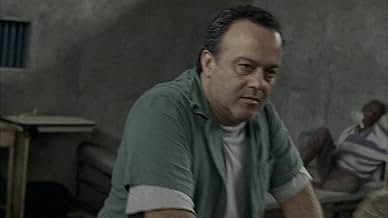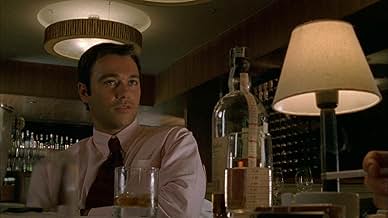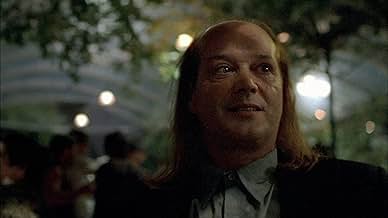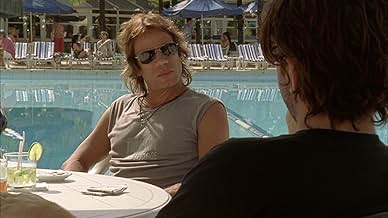Meu Nome Não é Johnny
- 2008
- 2h 4min
PUNTUACIÓN EN IMDb
7,2/10
8,1 mil
TU PUNTUACIÓN
Añade un argumento en tu idiomaThe true story of João Guilherme Estrella ("Johnny"), a young middle-class bon vivant who became a big-time cocaine dealer in Rio de Janeiro in the early 1990s.The true story of João Guilherme Estrella ("Johnny"), a young middle-class bon vivant who became a big-time cocaine dealer in Rio de Janeiro in the early 1990s.The true story of João Guilherme Estrella ("Johnny"), a young middle-class bon vivant who became a big-time cocaine dealer in Rio de Janeiro in the early 1990s.
- Premios
- 17 premios y 29 nominaciones en total
Argumento
¿Sabías que...?
- CuriosidadesTammy Di Calafiori's debut.
- PifiasAlthough the movie uses the correct 80s Brazilian money bills, in some shots the pricing lists shown uses currency from nowadays.
- ConexionesReferences Sabrina (1954)
Reseña destacada
Fast, hip and mod film adaptation of the true story of João Guilherme Estrella, an upper-middle-class dope-head who turned into serious addict and, against all odds, a top cocaine dealer in Rio de Janeiro in the early 1990s. The film follows his glamorized coke-snorting glory days and his later detention, trial, imprisonment and subsequent confinement in a state institution for mentally disturbed criminals. Based on the biography written by Guilherme Fiúza that provides most of the film's light tone and funny dialog, the film is a comedy -- yes, a comedy! -- about drug addiction and dealing, in the line of Ted Demme's "Blow" and particularly influenced by the episodic structure, pop flavor and sense of humor of Paul Thomas Anderson's "Boogie Nights".
The "rise" of Estrella in the drug world is made to look sexy, cool, adventurous and a lot of fun, though it isn't exactly believable -- his drug connections are never satisfactorily explained, probably because it's still legally dangerous to dot all the "ii". Anyway, it's obvious the filmmakers aren't interested in "denouncing" Rio's drug business, but in audience adhesion and laughter: even Estrella's sojourn in prison and in the appalling mental institution are meant to be funny, instead of depressing and scary, and the long sequence of Estrella being harassed and blackmailed by two corrupt cops seems inspired by the antics of Abbott & Costello or Oscarito & Grande Otelo.
The film is totally centered around Selton Mello, who finds in the part of Estrella the perfect vehicle for his peculiar cinematic persona: ironic, funny, non-chalant, quick-spoken, Mello acts as if he's ad-libbing and is the right choice for this kind of role, though possibly with the wrong physique (it's hard to believe that a man who admittedly sniffed up to 100 grams of coke per week could look this chubby -- but the real Estrella IS chubby, at least nowadays). The rest of the cast varies from fine (veteran Eva Todor, Cássia Kiss, Orã Figueiredo, the lovely and talented Rafaella Mandelli), to insipid (clueless Cléo Pires, whose role is fortunately rather small), from weird (Júlia Lemmertz plays Selton Mello's mother!) to over the top (Flavio Bauraqui and Aramis Trindade overacting once again).
Mauro Lima's direction shows assuredness and objectivity -- he's not a technique freak but there are some exciting dolly shots -- though the film would certainly benefit from a bigger budget and longer schedule (there are sequences in Barcelona and Venice that seem made in a terrible hurry). Lima and producer Mariza Leão wrote the clever script aiming at young audiences used to sitcoms and comic strips; well, the jokes do work and the dialog is above TV average, though the tear-jerking trial scene is longish and maudlin.
There are big issues that the film doesn't really want to discuss, like the fact that Estrella could play for laughs because, being white and middle-class, he knew he would come out alive and free from his failed drug-lord fantasy (whereas black and poor traffickers get dead or rot in prison). Or the fact that, though the film is being (mis)marketed as a "cautionary story" for teenagers who might be curious about experimenting with drugs, it's rather a "feel-good" drug movie that isn't really meant to warn or scare drug neophytes or anyone else, especially because of Selton Mello's "cool" demeanor and the happy-ending. On the contrary: I suspect many teenagers leave the theater with the idea that coke-snorting mustn't be all THAT bad (and we know, don't we, that coke has made its comeback). Despite the potentially violent and tragic overtones of the theme, the ultimate goal of the film is to be fun, cool and hip -- and that, "Johnny" undoubtedly succeeds.
PS: There's a final credit that states that João Guilherme Estrella is now drug-free and works as music producer, singer and composer, but don't scratch your head if you've never heard of him -- he's hardly famous. Following the film's big box-office results (2 million+ tickets sold), Brazilian EMI Music released Estrella's debut album as singer and composer, which was a big critical and commercial flop.
The "rise" of Estrella in the drug world is made to look sexy, cool, adventurous and a lot of fun, though it isn't exactly believable -- his drug connections are never satisfactorily explained, probably because it's still legally dangerous to dot all the "ii". Anyway, it's obvious the filmmakers aren't interested in "denouncing" Rio's drug business, but in audience adhesion and laughter: even Estrella's sojourn in prison and in the appalling mental institution are meant to be funny, instead of depressing and scary, and the long sequence of Estrella being harassed and blackmailed by two corrupt cops seems inspired by the antics of Abbott & Costello or Oscarito & Grande Otelo.
The film is totally centered around Selton Mello, who finds in the part of Estrella the perfect vehicle for his peculiar cinematic persona: ironic, funny, non-chalant, quick-spoken, Mello acts as if he's ad-libbing and is the right choice for this kind of role, though possibly with the wrong physique (it's hard to believe that a man who admittedly sniffed up to 100 grams of coke per week could look this chubby -- but the real Estrella IS chubby, at least nowadays). The rest of the cast varies from fine (veteran Eva Todor, Cássia Kiss, Orã Figueiredo, the lovely and talented Rafaella Mandelli), to insipid (clueless Cléo Pires, whose role is fortunately rather small), from weird (Júlia Lemmertz plays Selton Mello's mother!) to over the top (Flavio Bauraqui and Aramis Trindade overacting once again).
Mauro Lima's direction shows assuredness and objectivity -- he's not a technique freak but there are some exciting dolly shots -- though the film would certainly benefit from a bigger budget and longer schedule (there are sequences in Barcelona and Venice that seem made in a terrible hurry). Lima and producer Mariza Leão wrote the clever script aiming at young audiences used to sitcoms and comic strips; well, the jokes do work and the dialog is above TV average, though the tear-jerking trial scene is longish and maudlin.
There are big issues that the film doesn't really want to discuss, like the fact that Estrella could play for laughs because, being white and middle-class, he knew he would come out alive and free from his failed drug-lord fantasy (whereas black and poor traffickers get dead or rot in prison). Or the fact that, though the film is being (mis)marketed as a "cautionary story" for teenagers who might be curious about experimenting with drugs, it's rather a "feel-good" drug movie that isn't really meant to warn or scare drug neophytes or anyone else, especially because of Selton Mello's "cool" demeanor and the happy-ending. On the contrary: I suspect many teenagers leave the theater with the idea that coke-snorting mustn't be all THAT bad (and we know, don't we, that coke has made its comeback). Despite the potentially violent and tragic overtones of the theme, the ultimate goal of the film is to be fun, cool and hip -- and that, "Johnny" undoubtedly succeeds.
PS: There's a final credit that states that João Guilherme Estrella is now drug-free and works as music producer, singer and composer, but don't scratch your head if you've never heard of him -- he's hardly famous. Following the film's big box-office results (2 million+ tickets sold), Brazilian EMI Music released Estrella's debut album as singer and composer, which was a big critical and commercial flop.
- debblyst
- 8 ene 2008
- Enlace permanente
Selecciones populares
Inicia sesión para calificar y añadir a tu lista para recibir recomendaciones personalizadas
- How long is My Name Ain't Johnny?Con tecnología de Alexa
Detalles
- Fecha de lanzamiento
- País de origen
- Sitio oficial
- Idiomas
- Títulos en diferentes países
- My Name Ain't Johnny
- Localizaciones del rodaje
- Empresas productoras
- Ver más compañías en los créditos en IMDbPro
Taquilla
- Presupuesto
- 6.000.000 BRL (estimación)
- Recaudación en todo el mundo
- 10.422.746 US$
- Duración2 horas 4 minutos
- Color
- Mezcla de sonido
- Relación de aspecto
- 1.85 : 1
Contribuir a esta página
Sugerir un cambio o añadir el contenido que falta

Principal laguna de datos
By what name was Meu Nome Não é Johnny (2008) officially released in Canada in English?
Responde






















